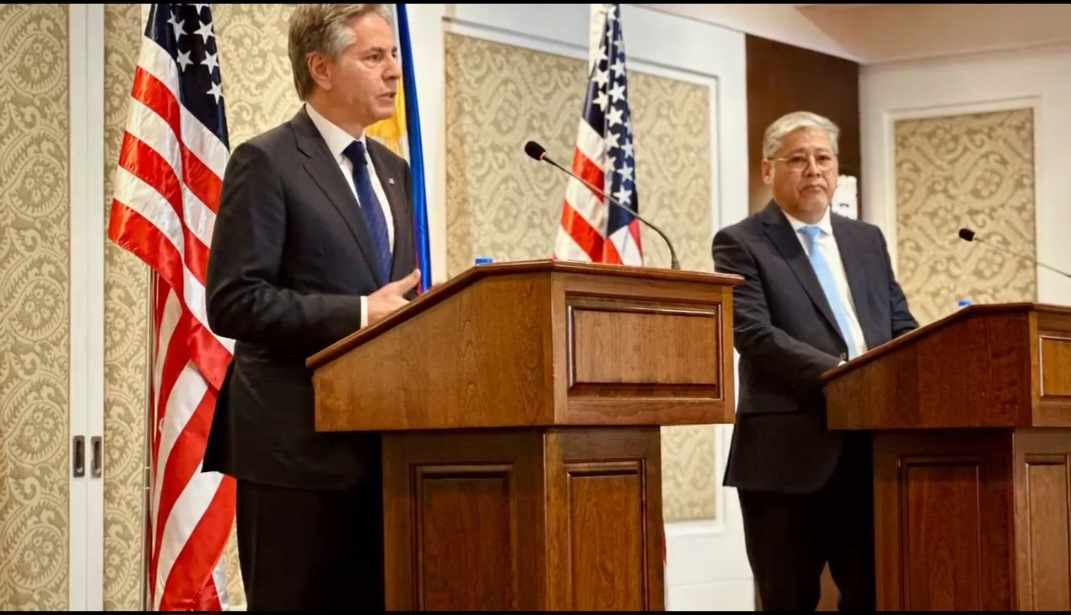

MANILA – The United States stands by its commitment to the Philippines in terms of its economic and defense cooperation, including under the Mutual Defense Treaty (MDT), as this extends to “armed attacks on the Filipino Armed Forces, public vessels, aircraft, including those of its Coast Guard, anywhere in the South China Sea.”
This is according to U.S. State Department Secretary Antony Blinken, who is in Manila on Tuesday, to meet President Ferdinand Marcos, Jr. and Department of Foreign Affairs Secretary Enrique Manalo.
In his speech during a joint press briefing in Pasay City, Blinken mentioned that the U.S. shared concerns about China’s actions in the South China Sea and in the Philippine’s Exclusive Economic Zone (EEZ), calling it a “threat to our common vision for a free, open Indo-Pacific.”
“Repeated violations of international law and the rights of the Philippines— water cannons, blocking manoeuvres, close shadowing, other dangerous operations. These waterways are critical to the Philippines, to its security, to its economy but they're also critical to the interests of the region, the United States and the world,” Blinken said.
He added that it is most important that both countries stand together with determination to uphold international law for the Philippines and for everyone else against any provocative actions.
Blinken’s visit to the country took place after a series of incidents between Chinese and Philippine ships and vessels in disputed waters in the West Philippine Sea, which resulted in collisions, damages and injuries among the Filipino crew members on board.
Meanwhile, Manalo confirms that both he and Blinken discussed regional issues, particularly the situation in the South China Sea.
“We discussed regional issues especially the situation in the South China Sea and I stated that the Philippines is committed to managing disputes in accordance with our national interests, a rules-based international order and international law, especially UNCLOS,” Manalo said.
“We reaffirmed our shared view that a strong and capable Philippines would make a formidable ally for the United States. And on this note, I underscored the importance of more substantial US investments towards enhancing our defense and civilian law enforcement capabilities,” Manalo added.

Screenshot shows Secretary Blinken answering questions from the media during a joint press conference with DFA Secretary Manalo in Pasay City on Tuesday. (Photo courtesy of Secretary Enrique Manalo’s X account)
Trilateral Leaders’ Summit with U.S., Japan, and the Philippines “not directed” against anyone
During the same joint press conference with Manalo, Blinken clarified that the upcoming Trilateral Leaders’ Summit slated on April 11 is “not designed against anyone”.
Without mentioning China, Blinken said, “The partnerships to the alliances that we have been building out that's actually been a central focus of our foreign policy, not only re-energizing, reinvigorating existing partnerships and alliances but reimagining them and building nuance that are fit for specific purposes.”
None of these are directed against anyone or anything, they're in service of something. It's in service of realising a common vision for the future to the benefit of people in all of our countries, he added.
Manalo echoed Blinken’s remarks by saying that the main purpose behind the trilateral summit is not just to enhance Philippine defense and security interests but operations on humanitarian issues as well.
“They are not aimed at any third country and they are specifically in accordance with our interest and needs and of course, with the cooperation of the United States,” Manalo said.
“So that is the main aim and, in fact, the only aim of these activities,” he added.
In a statement released by The White House, Press Secretary Karine Jean-Pierre officially announced on Tuesday that U.S. President Joe Biden will host Philippine President Ferdinand Marcos, Jr. and Japanese Prime Minister Kishida Fumio on April 11 at the White House for the first trilateral U.S.-Japan-Philippines leaders’ summit.
According to Jean-Pierre, at the summit, the leaders will advance a trilateral partnership built on deep historical ties of friendship, robust and growing economic relations, a proud and resolute commitment to shared democratic values, and a shared vision for a free and open Indo-Pacific.
The leaders will also reaffirm the ironclad alliances between the United States and the Philippines, and the United States and Japan, Jean-Pierre added.
The Press Secretary emphasized that during the summit, the three leaders will discuss trilateral cooperation to promote inclusive economic growth and emerging technologies, advance clean energy supply chains and climate cooperation, and further peace and security in the Indo-Pacific and around the world.




